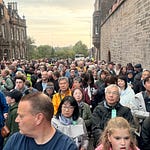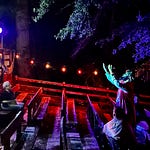I think doubt is a good thing. Necessary. Sacred, even. That’s because today, it’s part of the story.
Doubt belongs.
The Gospel of John, which we read from today, is already a kind of testimony about testimony. Most scholars suggest it took shape generations after Jesus’s death—rooted in oral tradition, fragments passed hand to hand, story to story. Maybe a single author. Maybe a community. Maybe a fisherman who somehow learned the best Greek on the Mediterranean, though probably not.
So when we read this Gospel, we are already reading something like an ancient game of telephone. The authors weren’t there. They got it from someone else. Maybe for them, Doubting Thomas represents a kind of figure in their community who has lots of questions about what it all really means. And who wants proof. Who has to see for themselves. It’s possible the story of Thomas is an invention meant to serve a larger purpose about what it means to believe. Or perhaps Thomas is a real historical figure whose story was embellished after the fact to achieve some different aims. To get after what it’s about, we need to deal with it up close and see what it means for us.
We’re therefore exactly in the shoes of this character in the story.
We’ve heard that Jesus has come back from the dead. What are we supposed to make of that? Are we supposed to take the word of fearful people gathered behind closed doors? I’m not so sure.
We have a sense about how Thomas would answer those questions. The locked rooms of today, full of people who are afraid like the other disciples in the text—maybe they do meet Jesus. Or maybe they just see what they want to see. I sometimes don’t know what to make of it.
To be charitable to those groups of people, I first need to say that we’re one of them. In the reading, a group of people gathers on the first day of the week, and Jesus shows up and passes the Peace. He shows them his Body. He sends them out. He forgives their sin.
The meeting with the disciples in the locked room has a liturgical shape to it. There are hints of the Eucharist, even the Lord’s Prayer. Folks gathered in a room, doing the stuff we now do week in and week out. The moral of the story? Maybe if Thomas were here, he’d experience Jesus, too.
But here’s the thing: he does. Up close and personal.
As the result of his doubts. As a result of being out there somewhere doing something else for a bit.
And that should stir in us some special love for doubters.
I, for one, think we need more doubters. Especially at this moment.
More people to shake us out of our assumptions. Out of the kind of fear that makes us run to certainty like an idol. Out of the bravado of hasty belief. People who challenge us when we see what we want to see. Who remind us that doubt and faith are companion followers of Jesus, not rivals. That even though a doubtful life is uncomfortable and perhaps not for everyone, it does play a part in the story.
A Thomas is a person who goes looking for proof. Of life.
And finds such proof in the woundedness of the Body of Christ.
Thomas in the story is looking for nail marks and pierced sides. There’s a way to see woundedness today, too, in our lives with the Body of Christ. Some of us will see the wounds in the broken bread and the poured wine and water we experience today in this room, just like those disciples gathered on the first day of the week in the story.
But there are some who, like Thomas, will insist we get a little closer. More personal. Who will challenge us to see Christ in the flesh. Who tell us the threshold for their belief requires direct contact. Intimacy. Eyeball to eyeball. Body to body.
We should listen to those Thomases among us. They will insist. They will prod and poke. They will necessarily doubt our story. That can be a good, good thing.
They might confront us with Thomas-like questions:
Unless I see churches using their power to make deep change…
Unless I see Christians stop trying to conquer the political landscape…
Maybe you have some questions like these:
Unless I get an explanation for unnecessary suffering…
Unless our world starts to make sense…
Unless I see these things, I doubt Christ is there at all. All some of us see some days are groups of people who swear up and down they’ve seen Jesus. All of the authority and none of the perspective. It is okay to push back on those narratives sometimes. To be the one voice with a catch in your throat while everyone is saying Alleluia.
Another way of saying this is that if we aren’t dealing directly with the Body, there’s good reason to believe Jesus isn’t there among us.
But when we do, he shows up.
Christmas Day, 2023
It’s a bleary-eyed morning after a long night of Christmas Eve services. A few of us are gathered, singing carols. I’m reading Scripture from this very spot when I look up and see a young family—mid-twenties maybe, a small boy and toddler in arms. A young family, brown-skinned, speaking little English, showing up on Christmas morning, looking for help. And I get the sense that God has shown up, incarnate.
January 15, 2025
In East Harlem, a side room at St. Edward the Martyr church. I’m with seminarians touring a ministry called El Barrio Angels. A music minister rushes around, reminding us to take courage. A Baptist minister translates for a young mother and child from a persecuted tribe in Africa as college social work professors take down her story for an asylum application. A holy scene: a mother and child. A Baptist shepherd. A chorus of “fear not, I bring you good tidings.” A handful of would-be wise men. Another Incarnation, erupting in flesh and fear and hope.
These are times Christ has shown up for me. This close. But you may have to take my word for it.
I think part of the lesson Thomas offers us is that Jesus is willing to show up whenever we start looking closely at the possibilities of Christ before us. Doubt is part of the sacred story.
A life of faith is supposed to involve close touch. Hands on.
May we go to where the Body is. And touch what others avoid.
That’s where the Resurrection is made real.
Where it isn’t something to be proven,
But something to be joined.
So:
What will your close encounter look like?
Or maybe a better question is something like:
If we aren’t touching the wounds—our own, each other’s, the world’s—can we say we’ve really met Jesus?
I doubt it.
Alleluia.
Note: The text and audio above is from a sermon delivered at Holy Trinity Episcopal Church in Fayetteville, North Carolina, based on readings for the Second Sunday of Easter, Year C.








